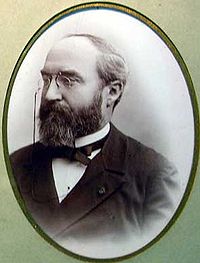
Marie-Adolphe Carnot
Encyclopedia

Chemist
A chemist is a scientist trained in the study of chemistry. Chemists study the composition of matter and its properties such as density and acidity. Chemists carefully describe the properties they study in terms of quantities, with detail on the level of molecules and their component atoms...
, mining engineer and politician
Politician
A politician, political leader, or political figure is an individual who is involved in influencing public policy and decision making...
. He came from a distinguished family: his father, Hippolyte Carnot
Hippolyte Carnot
Lazare Hippolyte Carnot was a French statesman.- Early life :Lazare was the younger brother of the founder of thermodynamics Sadi Carnot and second son of the revolutionary politician Lazare Nicolas Marguerite Carnot, who also served in the government of Napoleon. He was born at Saint-Omer,...
, and brother, Marie François Sadi Carnot
Marie François Sadi Carnot
Marie François Sadi Carnot was a French statesman and the fourth president of the Third French Republic. He served as the President of France from 1887 until his assassination in 1894.-Early life:...
, were politicians, the latter becoming President of the third French Republic.
He was born in Paris
Paris
Paris is the capital and largest city in France, situated on the river Seine, in northern France, at the heart of the Île-de-France region...
and graduated from the Ecole Polytechnique
École Polytechnique
The École Polytechnique is a state-run institution of higher education and research in Palaiseau, Essonne, France, near Paris. Polytechnique is renowned for its four year undergraduate/graduate Master's program...
in 1860, going on to join the Ecole des Mines, where he became professor
Professor
A professor is a scholarly teacher; the precise meaning of the term varies by country. Literally, professor derives from Latin as a "person who professes" being usually an expert in arts or sciences; a teacher of high rank...
in 1868, following a spell as an engineer
Engineer
An engineer is a professional practitioner of engineering, concerned with applying scientific knowledge, mathematics and ingenuity to develop solutions for technical problems. Engineers design materials, structures, machines and systems while considering the limitations imposed by practicality,...
around Limoges
Limoges
Limoges |Limousin]] dialect of Occitan) is a city and commune, the capital of the Haute-Vienne department and the administrative capital of the Limousin région in west-central France....
. By 1881 he was Chief Engineer of Mines, and by 1894 Inspector General of Mines, becoming Dean
Dean (education)
In academic administration, a dean is a person with significant authority over a specific academic unit, or over a specific area of concern, or both...
of the Ecole Nationale des Mines in 1901, a post he held until 1907. Aside from administrative work and teaching and training many engineers, he also wrote a treatise on the chemical analysis of minerals (Traité d'analyse des substances minérales, published 1898) and pursued research, in 1899 discovering the eponymous uranium
Uranium
Uranium is a silvery-white metallic chemical element in the actinide series of the periodic table, with atomic number 92. It is assigned the chemical symbol U. A uranium atom has 92 protons and 92 electrons, of which 6 are valence electrons...
ore
Ore
An ore is a type of rock that contains minerals with important elements including metals. The ores are extracted through mining; these are then refined to extract the valuable element....
carnotite
Carnotite
Carnotite is a potassium uranium vanadate radioactive mineral with chemical formula: K222·3H2O. The water content can vary and small amounts of calcium, barium, magnesium, iron, and sodium are often present.-Occurrence:...
.
He was honoured with membership of the Academy of Agriculture and Academy of Sciences, and was made Commander of the Légion d'honneur
Légion d'honneur
The Legion of Honour, or in full the National Order of the Legion of Honour is a French order established by Napoleon Bonaparte, First Consul of the Consulat which succeeded to the First Republic, on 19 May 1802...
. He simultaneously pursued a political career
Politics
Politics is a process by which groups of people make collective decisions. The term is generally applied to the art or science of running governmental or state affairs, including behavior within civil governments, but also applies to institutions, fields, and special interest groups such as the...
.

